Economy
Alaska Towns Freeze Gas Prices
by Angela Denning-Barnes
Listen Now [4 min 30 sec...link to NPR]
Morning Edition, November 16, 2007 · Gas prices in Bethel, Alaska, a remote bush town, range from $5 to $7 a gallon. The only saving grace for residents there and in many of the remote towns in western Alaska is that gas prices aren't going up. They were locked in during the fall when an entire winter's fuel supply was shipped in by river barge and stored.
Angela Denning-Barnes reports from member KYUK in Bethel, Alaska.
Top 10 villages with the highest gas, heating fuel prices
____________
MARCH 18, 2009 - 11:15 AM
A recent report on Alaska heating fuel and gasoline prices shows what many villagers already know: That as oil prices dropped this winter, the costs in many rural communities remained high.
Of the 100 communities that the state Division of Community and Regional Affairs surveyed this February, here are the 10 with the highest gasoline prices and heating fuel prices:
Top heating fuel costs as of Feb. 2009:
1. Arctic Village (Interior) -- $9.50 per gallon.
2. Point Baker (Southeast) -- $8.80 per gallon.
3. Emmonak (Western) -- $8.71 per gallon.
4. Hughes (Interior) -- $8.55 per gallon.
5. Kokhanok (South Coastal) -- $8.11 per gallon.
6. Koyuk (Western) -- $8.06 per gallon
7. Saint Michael (Western) -- $8.06
8. Atka (South Coastal) -- $7.99
9. Stebbins (Western) -- $7.99
10. Gambell (Wesern). -- $7.88
...
Top gasoline costs as of Feb. 2009
1. Arctic Village (Interior) -- $9 per gallon
2. Point Baker (Southeast) -- $8.80 per gallon
3. Hughes (Interior) -- $8.50 per gallon
4. Kokhanok (South Coastal) -- $8.40 per gallon
5. Deering (Western) -- $7.82 per gallon
6. Saint Michael (Western) -- $7.80 per gallon
7. Toksook Bay (Western) -- $7.74 per gallon
8. Wales (Western) -- $7.73 per gallon
9. Stebbins (Western) -- $7.71 per gallon
10. Koyuk (Western) -- $7.71 per gallon
(Remember, these numbers only represent the villages that the state surveyed.)
11.16.2007
8.22.2007
Yukon Healing Journey - YRITWC

Yukon River Healing Journey to Begin on June 22 Opening Ceremony Hosted by Tr’ondek Hwech’in First Nation in Moosehide, Yukon Territory
1,500 mile canoe journey aims to unite cultures, protect environment, and address climate change concerns.
LINK TO: YRITWC HOME/WEB PAGE
At 1 pm on June 22, 2007, the Tr’ondek Hwech’in First Nation will host opening ceremonies at Moosehide, Yukon Territory, to initiate the Healing Journey, a celebration of culture, a call to action, and an urgent message to the world. The 1,500 mile canoe journey will head to St. Mary's, Alaska to celebrate the 10th Anniversary YRITWC Summit from August 9-13.
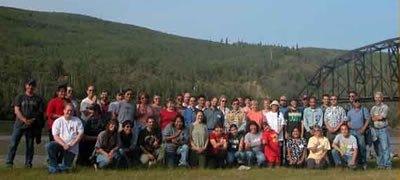
Moosehide, a traditional village, is located near Dawson, on the Yukon River.
Fulfilling an ancient prophecy of uniting the indigenous peoples through water travel, the Healing Journey participants will shove off with traditional canoes and contemporary boats and paddle for approximately seven weeks, visiting all indigenous communities along the way.
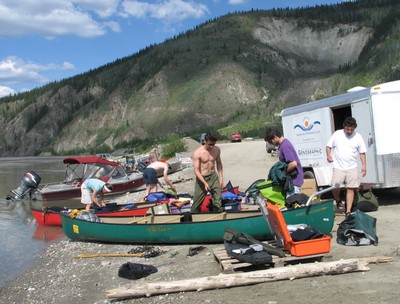
Visits will include a traditional meal and cultural exchange, dancing and drumming, and a talking circle to begin to mend the past and forge a commitment to a common future based on environmental stewardship and healthy communities. In honor of the Healing Journey, a traditional T’lingit dugout canoe has been carved by the Yakutat T’lingit Tribe and will be dedicated to the YRITWC in July during the nearly two month long Journey.
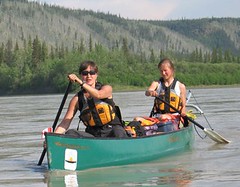
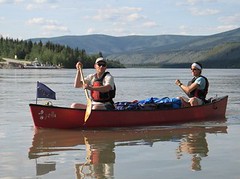
As the Healing Journey travels downriver, each participating community will share observations and concerns related to climate change, which will be documented and brought to the Summit in St. Mary’s. The Healing Journey will also draw attention to innovative solutions such as renewable energy and resource management based on traditional knowledge. One of the canoes will have a water quality probe that will take a continuous water chemistry profile of the entire journey as it travels downriver.
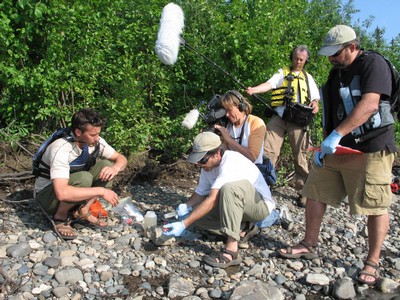
Harold Gatensby, a founding Board member of the YRITWC from Carcross-Tagish First Nation, stated, “The Healing Journey is the result of many years of hard work and commitment to clean water and healthy communities. We could not carry out this Journey without the support of all the First Nations and Tribes who are part of the Watershed Council.”
LINK TO: YRITWC BROCHURE (.pdf)
Jon Waterhouse, YRITWC Assistant Director and lead paddler in the Healing Journey, is from the Jamestown Sk’lallam Tribe in the coast Salish region. He said, “We hope to feed the interest of the youth to carry on this tradition of traveling by water and protecting our environment. The Healing Journey is for the whole watershed and beyond.”
The Yukon River Inter-Tribal Watershed Council is an indigenous grassroots organization dedicated to the protection and preservation of the Yukon River Watershed. The YRITWC conducts research, provides technical assistance and training to facilitate the development and exchange of information, and strives to raise awareness about opportunities to promote the health of the watershed. The YRITWC is comprised of 65 Tribes and First Nations in Alaska and Canada who rely on the Yukon River basin for survival.
LINK TO: YRITWC STRATEGIC PLAN (.pdf)
The Healing Journey and Summit are being sponsored in part by National Geographic Society and IBM’s Genographic Legacy Fund, First Nations Development Institute, the Environmental Protection Agency, and the Alaska Conservation Foundation.
Text originally published by John Graham
Photos from YRITWC website
View more photos from Matt here!
==============================
Listen to an audio transcript...Associate Director, Alaska Region, of the YRITWC speaking of the Journey...YRITWC appearing on Native America Calling, Aug. 2007.
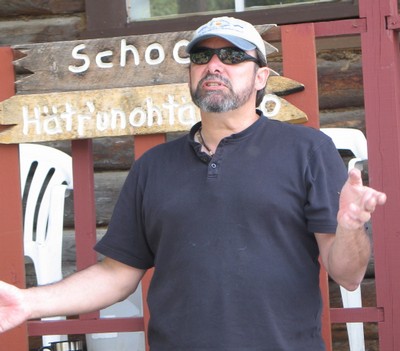
Subscribe to:
Posts (Atom)